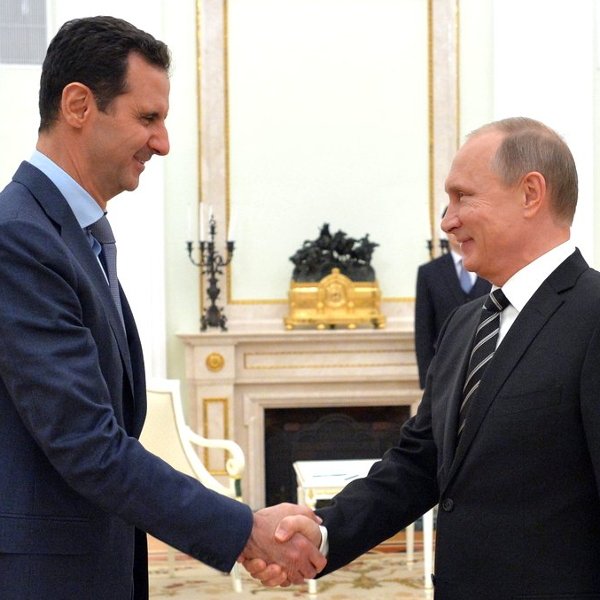No Resolution from Syrian Constitutional Committee
Bashar Al-Assad and Vladimir Putin at a meeting in Moscow in 2015 (Wikipedia)
A subcommittee group of 45 delegates, evenly distributed between Syrian government officials, civil leaders, and opposition groups, agreed on October 17 to meet in Geneva to discuss drafting a new constitution for the war-torn country. However, the subcommittee failed to move forward on a Syrian constitution.
In 2011, nonviolent protests in Daraa broke out during the Arab spring uprisings, beginning the Syrian civil war. The areas of the country currently under government control, led by the Syrian President Bashar Al-Assad, have been continuously accused of human rights violations, including arrests of innocent civilians, torture, and the use of chemical weapons against civilians. There are pockets not under Assad's rule, including portions of the country held by the Kurds, the rebel-held province of Idlib, and the U.S.-protected region of al Tanf at the border of Iraq and Jordan. However, Assad has the support of Russia, including its military forces and its support and veto vote at the UN. This has prevented anyone from being held responsible for the war crimes committed in Syria by the Assad regime.
In January 2018, Russia hosted the "Syrian peace conference" in Sochi, which established a 150-person team meant to represent the Syrian government, political opposition, and civil society equally. However, the dissenting groups that attended were only those approved by Damascus, and they had received training from pro-Assad forces on how to act and what to say at the conference. The Turkish rebel forces that arrived did not leave the airport. The UN did send its Syria envoy, Staffan de Mistura, to the conference in Sochi, establishing a sort of legitimacy for the conference.
On June 18, 2018, de Mistura met with high-ranking members of Iran, Turkey, and Russia, to discuss the actual formation of the Syrian Constitutional Committee. They met again on September 11, 2018, and tentatively agreed to a list of individuals for the committee. However, on November 29, 2018, with the 11th round of peace talks concluded, the countries were no further along in agreeing on a list of individuals for the committee. This continued with the August 3, 2019 meeting, where Russia, Iran, and Turkey still had not come to a definitive list of individuals for the committee. By September 18 2019, the UN General Secretary announced that it had finalized a list of 150 people for the committee. By October 30, 2019, the group had convened for its inaugural meeting, with the 45-member subcommittee responsible for actually drafting the constitution also convening on November 4, 2019. However, the portion of the group representing the Assad Regime stalled the talks.
The Committee continued meeting over 2020 and early 2021, with this most recent meeting in October slated to actually include drafting portions of the new constitution. However, after 5 days of talks, the committee failed to find any method of moving the process forward of drafting the constitution, and found no commonalities to be had between the groups. No date for the next round of talks has been determined.

